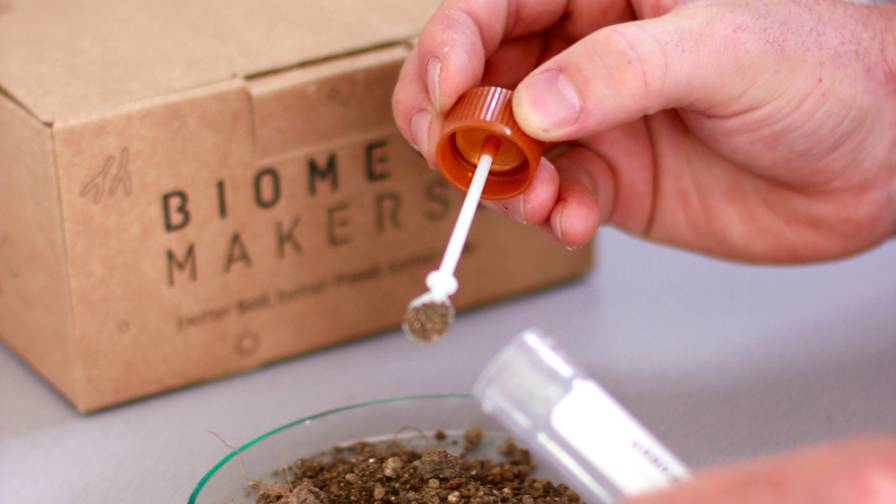Groundbreaking Research Validates Biome Makers’ BeCrop Soil Intelligence Technology
Groundbreaking Research Validates Biome Makers’ BeCrop Soil Intelligence Technology Agribusiness Global


Biome Makers Contributes to Scientific Studies Validating Soil Health Technology

Biome Makers, a global agtech company, proudly announces its contribution to the publication of two scientific studies validating the efficacy and reliability of the company’s revolutionary technology. These landmark papers demonstrate a significant leap forward in the field of soil health intelligence and predicting soil functionality.
First Study: Physicochemical Properties and Microbiome of Vineyard Soils from DOP Ribeiro (NW Spain) Are Influenced by Agricultural Management
The first study titled “Physicochemical Properties and Microbiome of Vineyard Soils from DOP Ribeiro (NW Spain) Are Influenced by Agricultural Management,” evaluated the impact of conventional and sustainable management systems of vineyards from DOP Ribeiro on the soil’s condition. The multidisciplinary research brought together expertise from a range of institutions:
- Estación de Viticultura e Enoloxía de Galicia (EVEGA-AGACAL)
- Instituto de Investigación en Análisis Químicos y Biológicos (IAQBUS) at the Universidade de Santiago de Compostela (USC)
- Biome Makers Inc
- Área de Edafología y Química Agrícola at the Departamento de Biología Vegetal y Ciencia del Suelo, Facultad de Ciencias, Universidade de Vigo
- Laboratorio de Evaluación y Tecnología Ambiental at the Campus da Auga-Campus de Ourense, Universidade de Vigo
Second Study: Enrichment of putative plant growth promoting microorganisms in biodynamic compared to organic agriculture soils
The second study, titled “Enrichment of putative plant growth promoting microorganisms in biodynamic compared to organic agriculture soils,” investigates regenerative versus organic agricultural soils in 3 locations in Germany and 21 locations in France. This was a collaborative effort between the University of Kassel, the University of Geisenheim, BioDynamie Services, and Forschungsring e.V. These studies highlight the effectiveness of Biome Makers’ technology, BeCrop, and its proprietary indexes in microbial metabolism, soil bio-sustainability, while also detecting stress, nutrient deficiencies, and correlating with different management practices.
Dr. Alberto Acedo, Biome Makers’ Chief Science Officer and co-founder, commented, “These papers are a testament to our commitment to transparency and scientific excellence. By opening our technology for peer review and validation, we aim to foster trust and collaboration while pushing the boundaries of soil health data and innovative technology.”
The significance of these findings extends beyond Biome Makers’ own technology; they also highlight the superiority of the soil database and intelligence over others in the market. As noted in one of the papers, “These results showed how the workflow of Biome Makers’ index inference works, but also that their databases are superior to the limited literature review we conducted for their verification.”
BeCrop Technology: Accessible and Powerful
In addition to its scientific validation, BeCrop Technology stands out for its accessibility via API connections. This means that BeCrop’s powerful soil intelligence solutions can seamlessly integrate into existing agricultural systems, enabling farmers and agricultural professionals to harness the benefits of advanced soil health assessment without disrupting their workflow.
These papers showcase the trust and credibility of Biome Makers’ BeCrop Technology. They provide a competitive edge and a foundation for building knowledge and references that contribute to the advancement of soil science globally.
About Biome Makers
Founded in California’s Silicon Valley in 2015, Biome Makers is one of the foremost global AgTech leaders, setting the standard in soil health with BeCrop technology. Built on industry-leading AgTech expertise and driven by data and science, Biome Makers connect soil biology to agricultural decision-making to optimize farming practices and reverse the degradation of arable soils. With labs across the globe, customers on 4 continents, and 1M+ acres of land impacted, Biome Makers revitalizes soil functionality and agricultural sustainability worldwide. See all author stories here.
SDGs, Targets, and Indicators
1. Which SDGs are addressed or connected to the issues highlighted in the article?
- SDG 2: Zero Hunger
- SDG 3: Good Health and Well-being
- SDG 15: Life on Land
2. What specific targets under those SDGs can be identified based on the article’s content?
- SDG 2.4: By 2030, ensure sustainable food production systems and implement resilient agricultural practices that increase productivity and production, that help maintain ecosystems, that strengthen capacity for adaptation to climate change, extreme weather, drought, flooding and other disasters, and that progressively improve land and soil quality.
- SDG 3.9: By 2030, substantially reduce the number of deaths and illnesses from hazardous chemicals and air, water, and soil pollution and contamination.
- SDG 15.1: By 2020, ensure the conservation, restoration, and sustainable use of terrestrial and inland freshwater ecosystems and their services, in particular forests, wetlands, mountains, and drylands, in line with obligations under international agreements.
3. Are there any indicators mentioned or implied in the article that can be used to measure progress towards the identified targets?
- Soil condition assessment (physicochemical properties and microbiome) in vineyards under different agricultural management systems.
- Detection of stress and nutrient deficiencies in agricultural soils.
- Comparison of microbial metabolism and soil bio-sustainability between different agricultural practices.
Table: SDGs, Targets, and Indicators
| SDGs | Targets | Indicators |
|---|---|---|
| SDG 2: Zero Hunger | Target 2.4: By 2030, ensure sustainable food production systems and implement resilient agricultural practices that increase productivity and production, that help maintain ecosystems, that strengthen capacity for adaptation to climate change, extreme weather, drought, flooding and other disasters, and that progressively improve land and soil quality. | – Soil condition assessment (physicochemical properties and microbiome) in vineyards under different agricultural management systems. |
| SDG 3: Good Health and Well-being | Target 3.9: By 2030, substantially reduce the number of deaths and illnesses from hazardous chemicals and air, water, and soil pollution and contamination. | – Detection of stress and nutrient deficiencies in agricultural soils. |
| SDG 15: Life on Land | Target 15.1: By 2020, ensure the conservation, restoration, and sustainable use of terrestrial and inland freshwater ecosystems and their services, in particular forests, wetlands, mountains, and drylands, in line with obligations under international agreements. | – Comparison of microbial metabolism and soil bio-sustainability between different agricultural practices. |
Behold! This splendid article springs forth from the wellspring of knowledge, shaped by a wondrous proprietary AI technology that delved into a vast ocean of data, illuminating the path towards the Sustainable Development Goals. Remember that all rights are reserved by SDG Investors LLC, empowering us to champion progress together.
Source: agribusinessglobal.com

Join us, as fellow seekers of change, on a transformative journey at https://sdgtalks.ai/welcome, where you can become a member and actively contribute to shaping a brighter future.







